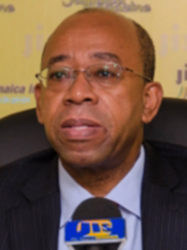The announcement here last year that ExxonMobil has located significant deposits of crude oil offshore Guyana has evoked a considerable level of interest both inside and outside Guyana, the most recent expression of interest in the likely implications of the oil find for the Guyana economy coming from Dr. Wesley Hughes, Chief Executive Officer of the Petro Caribe Development Fund.
Speaking on the issue of the desirability of the prudent management of resources deriving from oil, Hughes, in an interview with the Jamaica Gleaner urged the authorities here to take counsel from the experience of Jamaica which he said has not necessarily been a fount of wisdom as far as the earnings from the country’s bauxite resources have been spent.

“We (Jamaica) have exploited our bauxite reserves, which is, like oil, a wasting asset. I am not sure we have made the best use in terms of the utilization of the earnings from this reserve in building a long term capacity to replace the loss of bauxite. We established a capital development fund which was to take some of the resources of the bauxite sector and reinvest it into capital goods for future development of the country,” Hughes told the Gleaner.
A still limited public discourse is underway in Guyana though public participation therein is restricted by shallow knowledge of the oil and gas industry and its potential to boost the Guyana economy.
Recently, the David Granger administration announced that it intends to seek the approval of the National Assembly here for the setting up of a Sovereign Wealth Fund linked to the oil discovery which will also be expanded to garner revenues from other resources. Natural Resources Minister Raphael Trotman is on record as saying that “earnings from all of our natural resources will be housed within resource wealth management funds to the benefit of all Guyanese.”
Last year, ExxonMobil announced a “world-class oil discovery” off Guyana from a well that struck oil-bearing sandstone with an estimated 800 million to 1.4 billion barrels of oil.
Hughes is quoted as saying that Guyana “has always been potentially one of the richest countries in the region, if not the world, in terms of its resources” and that the utilization of oil resources for the people of Guyana and their future can benefit from lessons from Jamaica.
With regard to the use of resources secured from its bauxite industry, Hughes is quoted as saying that Jamaica had not done a good job. “We have consumed most, if not all of this resource. We’re looking to the future, towards the end of the bauxite sector, without a sufficient reinvest of the resources for long-term development as a replacement. Guyana doesn’t have to look to Trinidad and Tobago. They don’t have to look anywhere; they just need to look at what we have done and what we haven’t done.”
With regard to Jamaica’s disbursement of funds from the bauxite industry Hughes said that Jamaica had made decisions and choices that were less than long-term and unsustainable, noting that some of the decisions resulted in withdrawals “to fund the Budget rather than to save”.
Part of what is still a largely unstructured discourse in Guyana as to how government and the country as a whole should treat with earnings from the oil revenues revolves around the desirability of investing in the significant expansion of the agricultural sector in order to ensure that likely oil wealth, notwithstanding, Guyana does not surrender its reputation as a major producer and exporter of food.
Recently, an ExxonMobil official sought to cool such ardour as may exist locally about the prospects for limitless jobs in the oil and gas sector, pointing out that such employment prospects as might exist were likely to arise out of the use of earnings from the oil industry to strengthen existing sectors and create new ones that can provide jobs.
Guyana has, for decades, fantasized about the prospects of a radical economic transformation arising out of a major oil find though such prospects have always been tempered by concerns out of oil-rich Venezuela’s territorial claim to parts of the country where there is a high likelihood of the presence of large oil deposits.





